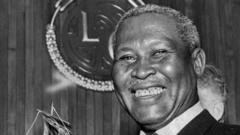Murray Sinclair's profound impact on Indigenous relations in Canada is marked by his role in revealing the dark history of residential schools, advocating for reconciliation, and amplifying Indigenous voices across the nation.
Murray Sinclair: A Champion for Indigenous Rights in Canada Passes Away

Murray Sinclair: A Champion for Indigenous Rights in Canada Passes Away
Murray Sinclair, revered leader in the fight for Indigenous rights in Canada, has died at the age of 73 after a long illness.
Murray Sinclair, the transformative advocate for Indigenous rights in Canada, passed away on November 4 at St. Boniface Hospital in Winnipeg, Manitoba. He was 73 years old. His family confirmed that he had been battling a long illness, which prevented him from attending events for his recently published memoir, "Who We Are."
Known by his Anishinaabe name, Mazina Giizhik, Sinclair was a pioneering figure, being the first Indigenous judge in Manitoba and later serving in Canada’s Senate. However, it was his pivotal role as the lead commissioner of the Truth and Reconciliation Commission of Canada from 2009 to 2015 that elevated his status on the national stage.
During his tenure, the commission gathered extensive testimonies from over 6,500 former students of the residential school system, identifying it as a form of "cultural genocide." These schools, which aimed to eradicate Indigenous languages and cultures, resulted in tragic consequences, with Sinclair stating that more than 3,200 children died due to malnutrition, abuse, and various forms of neglect, and further investigations suggested the real number could exceed 10,000.
The commission was initiated as part of the settlement stemming from a class-action lawsuit filed by former students against the Canadian government. Working tirelessly to document the systemic exploitation faced by Indigenous youths, Sinclair sought to guide Canadians toward a path of reconciliation with Indigenous communities.
Initially, the commission faced internal disputes over its direction, but it was Sinclair's calm and resolute leadership that ultimately provided a clear pathway for its essential work. By reframing the narrative around Indigenous history in Canada, he exposed long-hidden truths and called for a collective understanding of the injustices experienced by Indigenous people. His legacy will undoubtedly continue to inspire future generations in the pursuit of justice and equality.





















